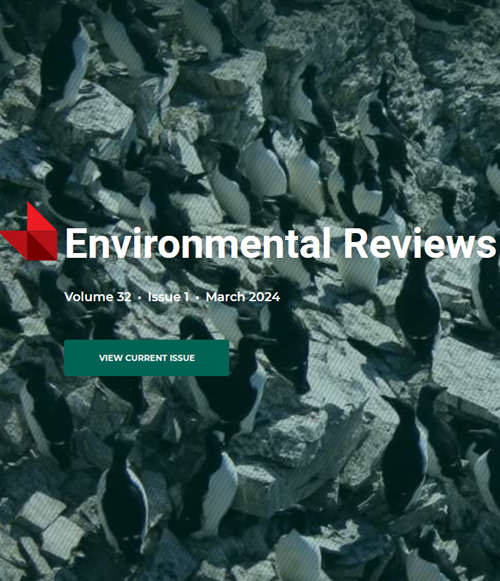北极海洋生态系统面临越来越大的气候压力
IF 5.1
3区 环境科学与生态学
Q2 ENVIRONMENTAL SCIENCES
引用次数: 0
摘要
北极变暖的速度比全球其他地区快得多,对北极海洋地区生态和生物敏感地区的各种物种造成了潜在的破坏性后果。然而,与其他生物群落相比,该地区的气候变化研究较少,阻碍了保护工作。在本文中,我们回顾和综合了现有的文献,以了解气候变化对北极海洋地区不同物种和生态系统的观测和潜在影响。我们回顾了253篇报道北极海洋地区物种和生态系统因气候变化而变化的文章(225篇研究记录了观测到的影响,28篇报告了预测的影响)。回顾显示,大多数研究工作只集中在北极大型海洋生态系统(LMEs)的一个子集(5/18 LMEs),大多数北极LMEs的研究很少。被审查的论文主要集中在海洋哺乳动物(19%),其次是微藻(17%)。许多研究记录了浮游生物群落(微藻、大藻、浮游动物)的变化,导致生态系统结构和功能的改变。据报道,海鸟和哺乳动物的繁殖失败、种群减少、饮食组成、行为和繁殖生物学发生了变化。此外,一些研究还观察到鱼类空间分布的变化。这篇综述提供了有说服力的证据,表明北极地区的多种气候变化指数正在发生变化,对海洋生物生态系统的几乎所有组成部分(从浮游生物到顶级捕食者)都产生了影响。我们确定了北极海洋生态系统气候变化研究中的一些空白(如有限的生物群库存,北冰洋尺度上支持气候变化指数的数据的稳健性,以及所有物种的气候适宜性评估),未来的研究可以帮助量化气候变化对物种和生态系统的影响,并促进对其适应性管理的理解。本文章由计算机程序翻译,如有差异,请以英文原文为准。
Arctic marine ecosystems face increasing climate stress
Arctic warming is occurring at a much faster rate than in other parts of the globe, with potentially devastating consequences for the diverse array of species within ecologically and biologically sensitive areas in the Arctic marine region. However, climate change research in this region is sparse compared to other biomes, hindering conservation efforts. In this article, we review and synthesize the available literature to understand the observed and potential impacts of climate change on different species and ecosystems in the Arctic marine region. We reviewed 253 articles reporting changes in species and ecosystems in the Arctic marine region in response to climate change (225 studies documenting observed impacts and 28 reporting predicted impacts). The review revealed that most research effort has been concentrated in only a subset of Arctic Large Marine Ecosystems (LMEs) (5/18 LMEs), with the majority of Arctic LMEs being poorly studied. The majority of the reviewed papers focused on marine mammals (19%) followed by microalgae (17%). A number of studies documented variability in planktonic communities (microalgae, macroalgae, zooplankton), resulting in alteration in ecosystem structure and function. Reproductive failure, decline in populations, and changes in diet composition, behavior and breeding biology were reported for sea birds and mammals. Further, shifts in spatial distribution of fishes were observed by several studies. This review provides persuasive evidence that multiple climate change indices in the Arctic region are changing, with impacts on almost all components of marine biotic ecosystems (from plankton to top predators). We identify a number of gaps (such as limited inventory of biota, robustness of data supporting climate change indices on an Arctic Ocean scale, and climate suitability assessment for all species) in climate change research in Arctic marine ecosystems where future studies can help to quantify the impacts of climate change on species and ecosystems and advance understanding for their adaptive management.
求助全文
通过发布文献求助,成功后即可免费获取论文全文。
去求助
来源期刊

Environmental Reviews
环境科学-环境科学
自引率
3.50%
发文量
45
期刊介绍:
Published since 1993, Environmental Reviews is a quarterly journal that presents authoritative literature reviews on a wide range of environmental science and associated environmental studies topics, with emphasis on the effects on and response of both natural and manmade ecosystems to anthropogenic stress. The authorship and scope are international, with critical literature reviews submitted and invited on such topics as sustainability, water supply management, climate change, harvesting impacts, acid rain, pesticide use, lake acidification, air and marine pollution, oil and gas development, biological control, food chain biomagnification, rehabilitation of polluted aquatic systems, erosion, forestry, bio-indicators of environmental stress, conservation of biodiversity, and many other environmental issues.
 求助内容:
求助内容: 应助结果提醒方式:
应助结果提醒方式:


